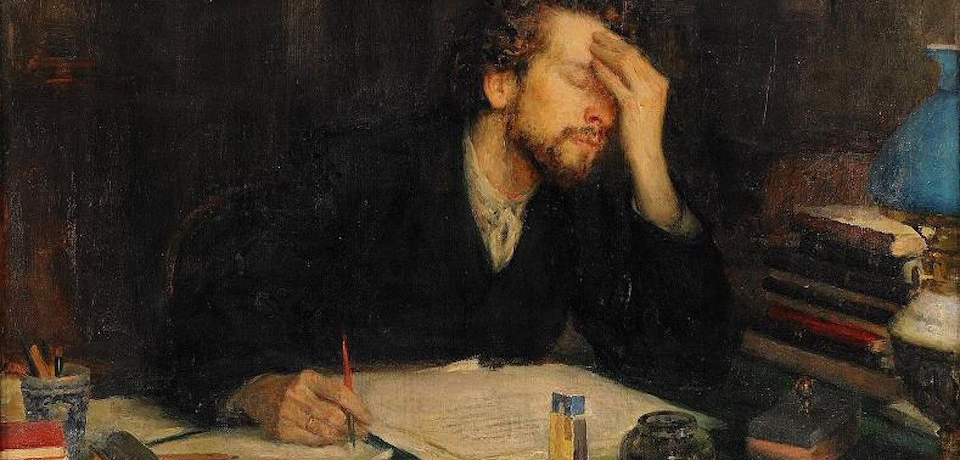After years of coercing family and friends into downloading Goodreads, I finally took the ultimate bibliophilic plunge: declaring a Literary Arts concentration. If asked, of course, I’ll tell you I study International and Public Affairs, as is listed on my LinkedIn and every document a potential employer could possibly encounter. Yet, in spite of a rather daunting warning from the Literary Arts website urging us writers to keep our interest in accounting on the back burner and “assume that (we’ll) rely on something other than creative writing in order to pay the bills”, I committed myself to taking 10 vaguely writing-related classes in the pursuit of literary prowess. This is the strict path to authorship I’ve developed in the two years I’ve spent in late-night fiction workshops.
1. Suffer horribly
As the novelist Aldous Huxley once said: “Perhaps it’s good for one to suffer. Can an artist do anything if he’s happy?” The answer is no. In my four semesters as a Literary Arts concentrator and three months of reading Ottessa Moshfegh, I have gleaned one primary lesson: all great artists lead miserable lives.
As a senior in high school, you likely remember well-intending peers yearning for a terrible tragedy to provide a compelling topic for their Common App personal statement. Samantha is so lucky her house burned down, you may have overheard. My parents aren’t even divorced. What is there to write about? If you’re reading this article, I can somewhat safely assume you’ve rejected the misery inherent to the Computer Science concentration. Alternative forms of suffering include impoverishment, orphanhood, and showering in the Hegeman communal bathroom.
2. Inspire similar suffering in others
The success of a piece lies in the dread it evokes in others. This is a lesson I learned after submitting my Advanced Fiction final: There’s something missing, my professor, whose writing has been prominently featured on the subreddit r/menwritingwomen, told me. It doesn’t quite expunge my beating heart from my chest and whittle it away, fiber by tender fiber, until but a pulsing, pulpy mess remains. I’d failed to embrace the dissociative nihilism so adored by today’s young adult readers.
“Make it sadder” is a piece of advice oft repeated in Literary Arts workshops, typically expressed by classmates who just finished either A Little Life or its Wikipedia synopsis. The devastating loss of a family member or a lifetime of chronic pain, I’ve realized, can salvage even the most poorly-written of stories. So, don’t hold back: condemn your main character—or their slow-burn love interest—to a prolonged, painful death.
3. Disregard all known rules of punctuation
Literary Arts concentrators from all walks of life have rejected quotation marks since Normal People was published in 2018. I, for one, omit them to maintain the gentle flow of prose, and not because I think it makes my writing look cool and smart.
But why stop with punctuation indicating dialogue? Margo Roth Spiegelman once said “The rules of capitalization are so unfair to words in the middle of a sentence.” May we all write like a John Green character by forgoing not just quotation marks, but also commas, question marks, and standard capitalization.
4. Employ every buzzword in your vocabulary
Perhaps you’ll recall my use of the phrase “dissociative nihilism” just paragraphs earlier. I certainly do—I’ve been patting myself on the back since typing it out. Buzzwords and phrases are not limited to the Literary Arts department, but concentrators are certainly not immune to their overuse. Some favorites I’ve encountered in my fiction classes include “anachronistic vulgarity,” “playful hypercapitalism,” and “the fetishization of sacrifice.”
5. Make your protagonist (i) a Myers-Briggs INTP and/or (ii) totally insufferable
Gone are the days of leading ladies who are not like other girls because they’re simply so much better. Today’s narrators are unlike other girls in that they’re violently disgusting. Whip-smart and emotionally detached, characters of the prototypical Literary Arts workshop piece champion the Myers-Briggs “N”, rejecting pragmatism in favor of the abstract. They’re crude, unlikeable, and in desperate need of some tidying up.
Why? As the Cult of the Literary Sad Woman goes, so goes the Literary Arts concentration.
And if, even after following these steps, your path to becoming a writer proves futile, you can switch your concentration to APMA-Econ here.
Image: “The Passion of Creation” by Leonid Pasternak via https://commons.wikimedia.org/
